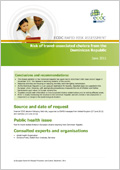# 6741
The announcement late last week that several new coronavirus cases have been detected in the MIddle East, including what appears to have been a limited cluster of cases in a household, has prompted an update from the ECDC of their risk assessment.
Available as PDF in the following languages:
ABSTRACT
Since June 2012 and up to 25 November 2012, a total of six confirmed cases of infection with the novel coronavirus (of whom two died) have been reported to WHO. All cases share a history of residence in, or travel to, the Kingdom of Saudi Arabia (KSA) or Qatar. The source and possible routes of transmission of the virus remain unknown.
ECDC updated risk assessment concludes that in the absence of evidence of sustained person-to-person transmission outside of household settings, the current facts still point towards a hypothesis of a zoonotic or environmental source with occasional transmission to exposed humans. WHO does not advise any travel or trade restrictions at this point for KSA or Qatar.
The main conclusions from this report include:
• In September 2012, a group of novel coronaviruses were identified in two patients presenting with a severe acute respiratory illness. Both had a travel history to the Kingdom of Saudi Arabia (KSA) or Qatar. These novel coronaviruses are genetically different from the virus that in 2003 caused the SARS outbreaks (SARS-CoV).
• Since June 2012 and up to 25 November 2012, a total of six confirmed cases of infection with the novel coronavirus (of whom two died) have been reported to WHO, meeting the requirements of its case definitions. Severe respiratory disease was the common factor in all of these. Two of the cases were diagnosed after being transferred to Europe for further medical care.
• All six confirmed cases reside or travelled to KSA or Qatar. Two confirmed cases in KSA are from the same family household. A further person in this household is under investigation for infection with the novel coronavirus.
• The source and possible routes of transmission of the virus remain unknown. Investigations have yet to identify the source or route of infection and infectiousness. At this stage, the detection of a household cluster does not provide conclusive evidence for or against limited person-to-person transmission. It is possible that enhanced surveillance in KSA, Qatar and elsewhere will detect additional sporadic cases and clusters.
• Initial laboratory analyses in Europe of the first of these viruses (known as hCoV-EMC) suggest that it may be able to infect a range of mammalian cells including human cells making human-to-human transmission theoretically possible.
• Healthcare workers should be made aware of the possibility of attending to patients matching the characteristics of patients requiring investigation as per WHO case-definition; however, the geographical area should be extended from KSA and Qatar to include the whole of the Middle East. Healthcare workers caring for patients under investigation should exercise stringent infection control measures following national or international guidance. Testing for the novel coronaviruses should be considered in patients potentially undergoing medical evacuation for acute respiratory distress syndrome (ARDS) prior to their transfer. Healthcare workers caring for confirmed cases and close contacts of confirmed cases should be monitored for symptoms.
• Patients returning from the Middle East with unexplained pneumonia or ARDS, i.e. where full diagnostic workup for respiratory pathogens (bacterial and viral) is negative, should be considered for investigation and tested for novel coronavirus by EU national reference and research laboratories capable of such testing.
• Any probable or confirmed case being diagnosed in the EU/EEA should be reported to national authorities, through the Early Warning Response System (EWRS) and to WHO under the International Health Regulations (2005) (most easily via the option to report to IHR through EWRS to avoid double report entry).
Related Post:
Widget by [ Iptek-4u ]
